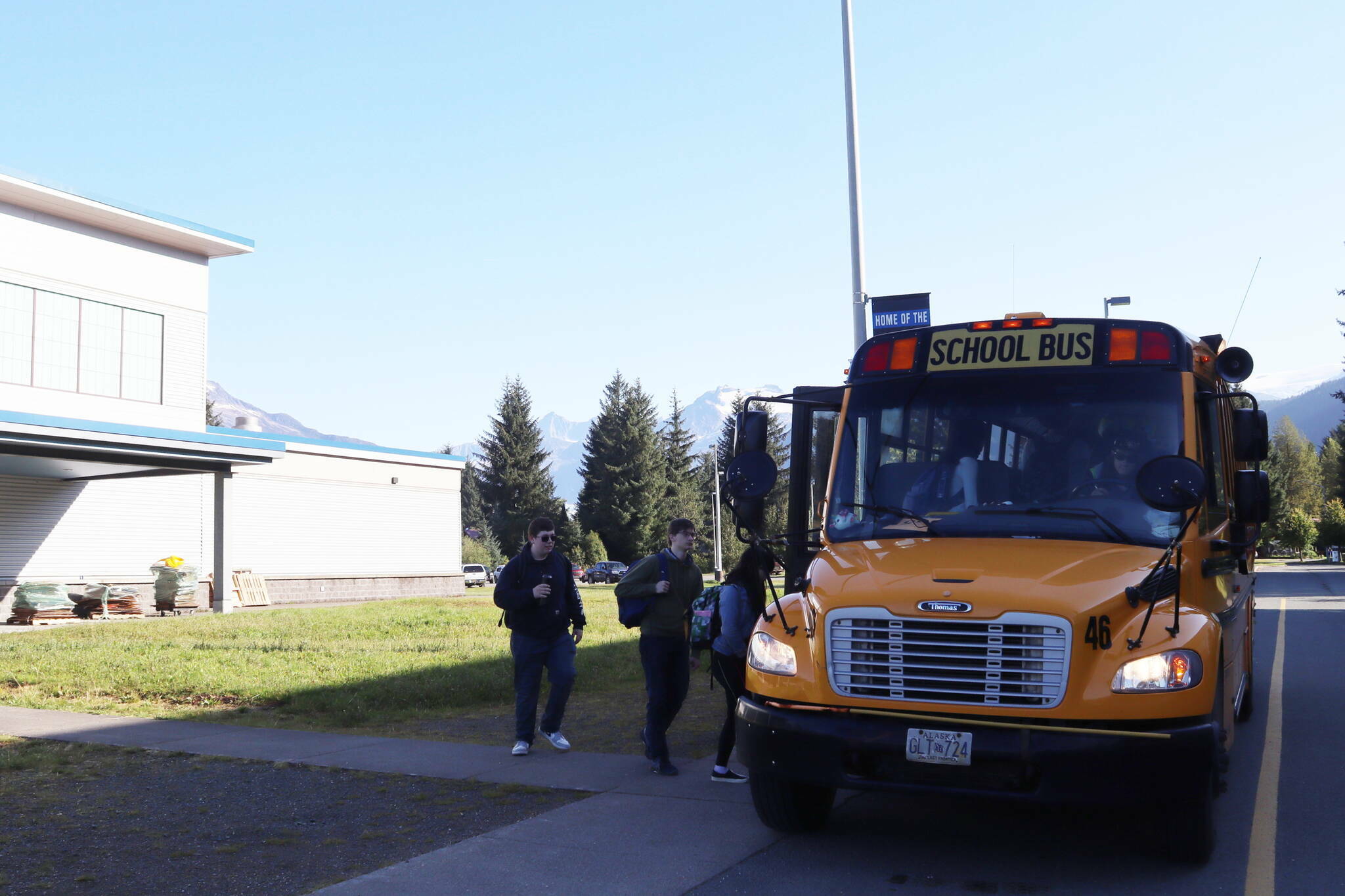A proposed state regulatory change will potentially strip the Juneau School District of millions of dollars in annual funding from Juneau’s municipal government — whose support was a critical element in resolving a financial crisis this year — according to Juneau School District leaders considering a formal response to the change during a school board meeting Tuesday night.
The Juneau Board of Education’s discussion occurred immediately after the board approved a fix for last year’s budget, spending about $765,000 of surplus funds to cover deficits in food service and high school activity expenses — both items city funds couldn’t be used for with the state’s proposed change. Board members approving the fix said they hope it ensures the upcoming budget-drafting cycle is the first in years where they’re starting out with a clean balance sheet.
But the proposed change by the state Department of Education and Early Development (DEED) would alter the definition of a municipal government’s “local contribution” in a way that would greatly limit what the City and Borough of Juneau is now providing, said Juneau School District Superintendent Frank Hauser during the meeting.
“Should this change in regulation occur the district would lose funding in pupil transportation, food service and student activities that DEED has previously advised the district was not included in the definition of local contribution,” he said.
Specific items recently funded range from after-school childcare to wrestling mats, which district officials have said are characteristic of non-instructional things the district has funded that way for many years. DEED imposes a “cap” on how much money municipalities can add to the base amount provided by the state for purposes such as instruction and administrative costs, but numerous municipalities provide non-instructional funds beyond that cap.
The regulatory change as currently proposed by DEED would cost the district between $1.7 million and $2.3 million, according to Hauser. The school district’s operating budget for the current fiscal year is roughly $73 million.
School board members unanimously approved having district staff and Juneau’s municipal attorney draft a resolution opposing the proposed change for consideration at the board’s next meeting.
“We’ve all been fighting the best we can for a very long time,” said Will Muldoon, chair of the school board’s Finance Committee. “And I think that if we don’t come out and repudiate this in the strongest terms — it likely will have a decent chance of passage without — but I think that it is important that we go on the record and say where we are on this item.”
Lori Weed, DEED’s school finance manager, said in an interview Wednesday the change — if approved by the state board of education — would likely take effect for the 2027 fiscal year beginning July 1, 2026, giving districts a year to adjust to the new regulation.
“It is still a draft, it’s still in the works,” she said, noting as of now the state education board is likely to give initial consideration to the proposed change at its meeting next February. That could be followed by a 30-day public comment period, with the board potentially voting on it during its subsequent quarterly meeting.
Changes are already being made to the draft considered by the Juneau school board Tuesday due to initial feedback received from the Alaska Association of School Business Officials, Weed said.
“I haven’t had a chance to do any draft revisions,” she said.
Muldoon said he’s concerned the state’s change will have a wider impact than the “local contribution” costs mentioned by Hauser, including prohibiting a “shared services” agreement approved by the Juneau Assembly this year to help resolve a sizeable budget shortfall.
Under that agreement the city took over $3.9 million for fiscal 2024 and $1.65 million in fiscal 2025 involving maintenance and other expenses for buildings used by both the city and the district for non-instructional purposes such as recreational programs.
“I’ve been worried about this for a very long time,” Muldoon said. “I’ve tried to figure out even roughly what it would cost us and I don’t have the foggiest idea, and that really, really scares me.”
Hauser, in a memo presented to the school board, noted the change as written may go beyond municipal government funds to include “community and non-instructional programs local governments may choose to support now and into the future.”
DEED’s proposal is an extension of a dispute that originated in June of 2023 when the state challenged about $2.3 million in city funding that allegedly exceeded the “cap” on what municipalities can provide to supplement state funding. Similar warnings were sent soon after to all Alaska school districts, with DEED officials declaring the state in recent years had failed federal Impact Aid program (IAP) disparity tests, which in Alaska means there must be less than a 25% funding difference between the highest- and lowest-funded districts.
However, the state dropped its challenge last Dec. 1 — essentially agreeing the district was complying with the state regulation as written — while also declaring it intended to seek a change to the regulation allowing a similar challenge to be revived.
Hauser’s memo states DEED’s justification for the regulatory change is flawed because earlier this year IAP officials “told DEED that the state is passing the FY 2025 disparity test by a wide margin.”
Weed said some disputes involving IAP findings are still pending and the proposed change is to prevent future disparity test violations. She estimates the current proposed amendment would affect about half a dozen districts that fund over the state cap and involved less than $10 million in total funds.
The state has been embroiled in other funding disputes with school districts and the federal government, as well as with some legislators and other policymakers who say per-student state funding for schools has remained largely unchanged and thus been severely eroded in real-dollar terms due to inflation.
• Contact Mark Sabbatini at mark.sabbatini@juneauempire.com or (907) 957-2306.

